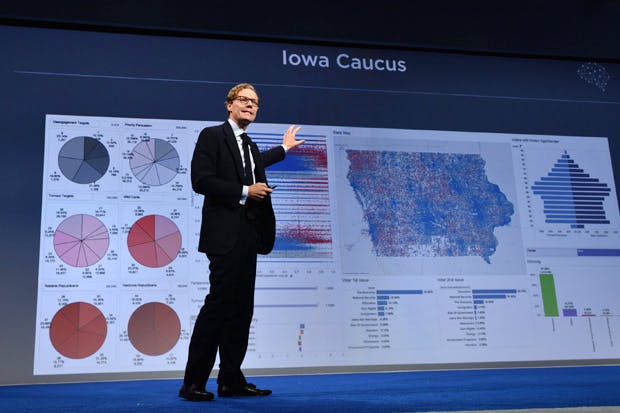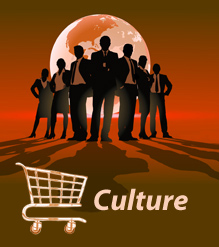



| Business-Managed Democracy » Culture » Social Media » Elections » Cambridge Analytica |
 Cambridge Analytica is a company that provided the data analysis for the Trump and Brexit campaigns.
Cambridge Analytica is a company that provided the data analysis for the Trump and Brexit campaigns.
In 2014 Cambridge Analytica was formed by the SCL Group and Robert Mercer. It is 90% owned by Robert Mercer, “a secretive hedge fund billionaire” and Donald Trump’s largest donor, and 10% by SCL. Other conservative billionaires associated with Cambridge Analytica include Rupert Murdoch.
SCL was a British psychological warfare firm, using military methods of “mass sentiment change” — winning ‘hearts and minds’ — to influence election results in developing nations such as Afghanistan and Pakistan. These were referred to in the military as ‘psyops’ or psychological operations and outside the military as mass propaganda. It was “effectively part of the British defence establishment. And, now, too, the American defence establishment.” These military strategies of mass persuasion, drawing on the harvesting of data from large populations, have now been used on civilian populations in the home nations.
In 2014 Aleksander Kogan (now named Spectre) founded Global Science Research. Kogan’s firm collected data for SCL using a Facebook survey of over 100,000 people who downloaded an app. This enabled the company to collect data on them and their Facebook friends, an estimated 30 million profiles in all. The likes and demographic data from these 30 million people were “harvested” without their knowledge to use in election campaigns. Kogan claimed in late 2014 to have “a sample of 50+ million individuals about whom we have the capacity to predict virtually any trait.” The aim was to develop algorithms that would facilitate the profiling of US citizens for campaigning purposes.
After GSR’s activities were exposed in The Guardian in 2015, Facebook requested GSR delete the data it had gleaned from Facebook users and believes it complied. What happened to the algorthms is unknown. A co-owner of GSR, Joseph Chancellor, who played a major role in the data gathering project, now works for Facebook Research.
Cambridge Analytica, which claimed to have no relationship with Global Science Research, claimed on its website to have psychological profiles on 220 million American voters based on 5000 pieces of data on each person. It claims it can “use this data to understand people’s deepest emotions and then target them accordingly”.
Cambridge Analytica drew on Facebook to get much of its vast database. Its psychologists claimed to be able to determine personality traits, political affiliation, sexuality and other traits from people’s Facebook ‘likes’. This database was expanded by paying people a small amount to undertake a personality quiz on the condition they downloaded an app that gave the researchers, from Cambridge University’s Psychometric Centre, access to their Facebook profiles and that of their ‘friends’, who did not give such permission. The survey was done by over 6 million people.
 Reference: Sue Halpern. ‘How He Used Facebook to Win.' The New York Review of Books, 8 June 2017.
Reference: Sue Halpern. ‘How He Used Facebook to Win.' The New York Review of Books, 8 June 2017.According to the investigative reporter Mattathias Schwartz, writing in The Intercept, a further 185,000 people were recruited from an unnamed data company, to gain access to another 30 million Facebook profiles. Again, none of these 30 million people knew their data were being harvested and analyzed for the benefit of an American political campaign.
The psychological insights gained enabled Cambridge Analytica to target individuals with personalised messages and potentially change their behaviour. One study, by University of Cambridge researchers, claimed that “likes alone could predict race with 95 percent accuracy and political party with 85 percent accuracy.” According to Michal Kosinski, the Cambridge University’s Psychometric Centre’s lead scientist, knowing 150 likes of a Facebook user would enable their model to “predict someone’s personality better than their spouse. With 300, it understood you better than yourself”.
 Reference: Carole Cadwalladr. ‘The Great British Brexit Robbery: How Our Democracy Was Hijacked.’ The Guardian. 7 May 2017.
Reference: Carole Cadwalladr. ‘The Great British Brexit Robbery: How Our Democracy Was Hijacked.’ The Guardian. 7 May 2017.The company also (perfectly legally) bought consumer datasets – on everything from magazine subscriptions to airline travel – and uniquely it appended these with the psych data to voter files. It matched all this information to people’s addresses, their phone numbers and often their email addresses.
Whilst there are strict laws in the US about what data can be collected by government on its citizens, those laws don’t apply to private companies. Cambridge Analytica was able to undertake “bio-psycho- social profiling”, utilising physical, mental and lifestyle information about people to better understand how they will respond, “how they react emotionally.”
According to Tamsin Shaw, an associate professor of philosophy at New York University,
 Reference: Quoted in Carole Cadwalladr. ‘The Great British Brexit Robbery: How Our Democracy Was Hijacked.’ The Guardian. 7 May 2017.
Reference: Quoted in Carole Cadwalladr. ‘The Great British Brexit Robbery: How Our Democracy Was Hijacked.’ The Guardian. 7 May 2017.The capacity for this science to be used to manipulate emotions is very well established. This is military-funded technology that has been harnessed by a global plutocracy and is being used to sway elections in ways that people can’t even see, don’t even realise is happening to them… It’s about exploiting existing phenomenon like nationalism and then using it to manipulate people at the margins. To have so much data in the hands of a bunch of international plutocrats to do with it what they will is absolutely chilling. We are in an information war and billionaires are buying up these companies, which are then employed to go to work in the heart of government. That’s a very worrying situation.
Cambridge Analytica claims it could classify voters according to five personality types (developed by others) “OCEAN — Openness, Conscientiousness, Extroversion, Agreeableness, and Neuroticism” . These traits could be used to target groups of people with “narrowly tailored messages” aimed at selling them products, services or election candidates. For example, according to CA, “neurotic voters tend to be moved by ‘rational and fear-based’ arguments, while introverted, agreeable voters are more susceptible to ‘tradition and habits and family and community’.”
© 2018 Sharon Beder
http://www.herinst.org/BusinessManagedDemocracy/culture/socialmedia/CA.html
